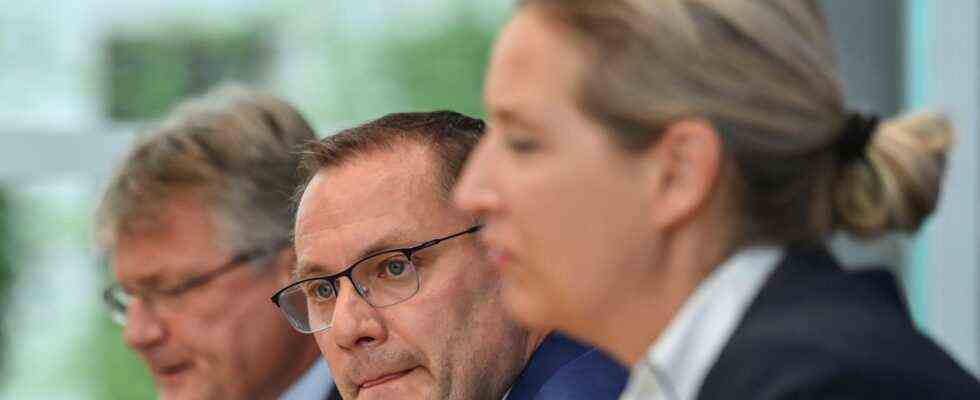analysis
Status: 27.09.2021 3:55 p.m.
In the election campaign there was a truce, but the day after the AfD is back in the power struggle. This is also due to the election result, which shows a clear east-west divide.
Sometimes gestures say more about the internal division of a party than words: AfD top candidate Alice Weidel certified herself in the “elephant round” of ARD and ZDF, having been a “very successful parliamentary group leader” for four years, announced that they would stand for re-election in tandem with Tino Chrupalla on Wednesday. When he heard this, AfD party leader Jörg Meuthen – around 15 kilometers away at the election party in Berlin-Marzahn – clapped his hands over his head so that everyone could see it.
The struggle of the party camps for the authority to interpret the AfD result had already started on the evening of the election and broke out the next day for all to see.
“We tended to serve our own bubble with the election program and certainly also with the top candidates,” criticized party leader Meuthen in an interview with the ARD capital studio. In other words: In his view, the AfD failed to steal votes from the Union in view of its historically poor results. A verbal kick in front of the shin for the top candidate duo Tino and Weidel.
“I will not let the result be badly talked about – by anyone,” countered Weidel on Monday, who fought a tangible interpretation duel with Meuthen at the federal press conference: While Weidel calls the result “stable”, party leader Meuthen followed up with the sentence, he thinks “satisfaction is inappropriate”.
Growth in the East
Observers would hardly have thought it possible that the AfD was tearing itself apart again the day after the general election. It is hard to imagine what would have happened if the party had slipped below the psychologically important mark of ten percent nationwide. Within the party, this would undoubtedly have been perceived as an election debacle.
The blue bar has shrunk to 10.3 percent. Nevertheless, Weidel and Chrupalla can now continue to claim for themselves that the AfD has become an indispensable part of the Federal Republic of Germany’s party landscape.
The catch: this is mainly due to the growth in the east. It is the strongest force in Saxony and Thuringia with around a quarter of the votes, and it has won 16 direct mandates. Unlike in the West, the AfD feels here as a “people’s party”, as it calls itself again and again. But this east-west divide harbors dangers for the party, because it threatens to deepen the internal division.
More radical right wing course
Because the eastern regional associations are relying on a far more radical right wing course than those in the west: First and foremost Thuringia’s AfD boss Björn Höcke, who is classified as “right-wing extremist” by the protection of the constitution. And who regularly castigates the “ingratiation” of party leader Meuthen to other parties, equated corona vaccinations with “genetic manipulation” in the election campaign.
In any case, the Eastern associations dominated by the ex “wing” now feel confirmed in their course. “We will of course see: What have we done better in the eastern federal states than in the western”, notes AfD boss Chrupalla with relish. “It would be good if you learn from the East,” says Thuringia’s co-party leader Stefan Möller. In view of this, party researchers are already predicting further radicalization of the AfD.
In any case, the last largely kept truce of the party camps, which enabled a conspicuously inconspicuous election campaign, is now over. At the party congress in December, a decision will be made on the future federal executive board and thus also on the future course. Federal spokesman Meuthen recently left it open whether he would run again. In any case, he can hardly hope for the support of Weidel.
Fight for parliamentary group chairmanship
Much earlier, however, another preliminary decision is due: The top candidate duo Chrupalla and Weidel want to be elected as parliamentary group chairman tandem this Wednesday. Chrupalla, who is praised by many as a “hardworking election fighter”, is deemed to have been set. Opponents of Weidel could, however, try to vote on the parliamentary group leadership not in a package, but individually, one hears from the party. Meuthen already indicated that he would welcome this. If that succeeds, Weidel’s candidacy would falter
The fact that it was not so much in the light of public interest in view of an election campaign that was largely poor in headlines and a not-too-surprising election result was an almost unfamiliar role for the AfD. That has suddenly changed again in view of the internal power struggle that has now broken out again.

